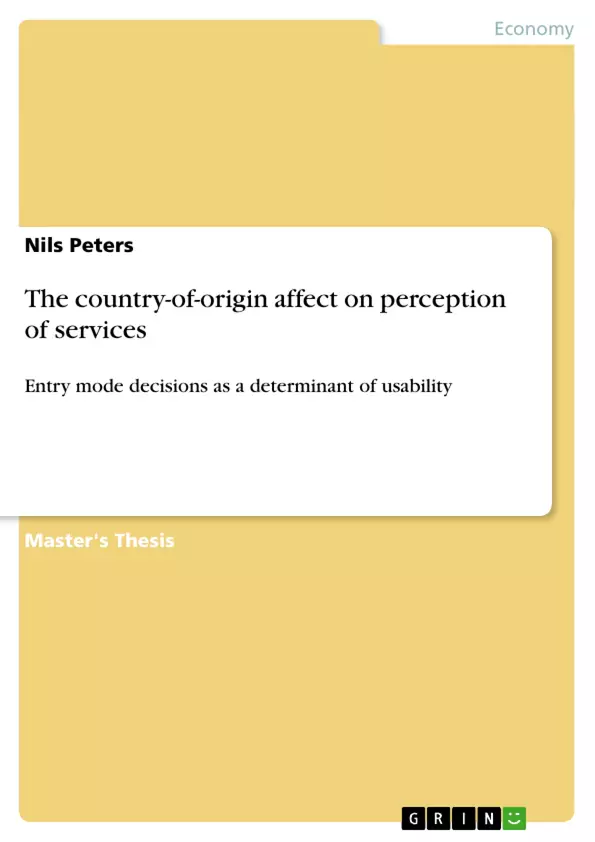Today, the service sector contributes to a major part of the GDP of the most developed countries, while the share of services of the total export of these countries is comparable low. This constitutes certain challenges for the internationalisation of services. With regard to the use of “country-of-origin effects” (COO), the special service characteristics create challenges for service companies, e.g. by the inseparability of service provision and consumption. When decisions on the market entry options are made and local staff is favoured to expatriate staff, incongruence in the COO facets occurs which is difficult to hide. Based on the research on products, this might reduce COO’s positive effects on service consumers’ quality expectations (ESQ). In this context, the question arises whether information on training in the company’s home country (CTI) can reduce the aforementioned negative effect.
In order to examine the existence of these relationships, an online provided self-administered experiment was created. Using a non-probability sample of 100 Germans, respondents were asked to rate two different service examples with regard to the ESQ. In each example, the country of the person providing the service (CPI) was manipulated to be congruent as well as incongruent to the company’s origin. In addition, the CTI was added to incongruent service examples.
Inhaltsverzeichnis (Table of Contents)
- Introduction
- Services and their Economic Importance
- The Challenging Internationalisation of Services
- Country-of-Origin and its Effects on the Internationalisation of Services
- Purpose of this Work
- Research Questions
- Objective
- Structure of this Work
- Internationalisation of Services
- Characteristics of Services
- Motives for Internationalisation
- Entry Modes
- Factors Influencing the Selection of Entry Modes
- Approaches to Systematise Services and their Potential for Internationalisation
- COO Effect
- Critical Analysis of the COO Literature with regard to Products
- Mode of Action of COO Effects
- Critical Analysis of the COO Literature with regard to Services
- COO as Multi-Facet Construct
- Methodology
- Problem and Research Questions
- Theoretical Framework: Hypothesis, Variables and Manipulations
- Research Design
- Sampling Process
- Research Instrument
- The Pilot Study
- Selection of Services
- Method of Analysis
- Gaining Confidence on the Results
- Results of the Main Study
- Demographic Information
- Preliminary Work: Calculating the ESQ Value
- Manipulating the CPI Information
- CTI Information in Service Offers with Incongruent CPI Information
- CTI Information to Outbalance Negative Effects based on Incongruent CPI Information
- Summarizing the Results
- Conclusions and Limitations
- Background
- Conclusions
- Limitations
- Further Research
Zielsetzung und Themenschwerpunkte (Objectives and Key Themes)
This work explores the impact of "country-of-origin effects" (COO) on consumer perceptions of services, focusing on the role of entry mode decisions in determining service usability. The research specifically investigates how COO effects are influenced by the congruence between the country of service provision (CPI) and the company's origin, and whether training information from the company's home country (CTI) can mitigate negative effects arising from incongruence.
- The influence of COO effects on consumer perceptions of services
- The impact of entry mode decisions on COO effects
- The role of congruence between CPI and company origin in shaping COO effects
- The potential of CTI to compensate for negative effects arising from incongruent CPI
- The implications of these findings for service companies and future research
Zusammenfassung der Kapitel (Chapter Summaries)
The introductory chapter establishes the context of service internationalization, highlighting the challenges posed by COO effects and the specific characteristics of services. It outlines the research questions, objectives, and structure of the work. Chapter 2 delves into the complexities of service internationalization, exploring the motives, entry modes, and factors influencing entry mode selection. Chapter 3 provides a critical analysis of COO literature in the context of both products and services, emphasizing the multi-faceted nature of COO effects and their implications for service companies. The methodology chapter details the research design, sampling process, research instrument, and data analysis techniques employed in the study. Results are presented in Chapter 5, focusing on demographic data, the calculation of ESQ values, the manipulation of CPI information, and the influence of CTI on consumer perceptions. The final chapter summarizes the study's conclusions, acknowledging limitations and suggesting avenues for further research.
Schlüsselwörter (Keywords)
The work centers on the key concepts of country-of-origin effects (COO), service internationalization, entry mode decisions, service usability, consumer perceptions, congruence, training information, and empirical research. The study explores these concepts within the context of a service company's decision-making process for entering new markets, aiming to provide valuable insights for future research and practical application.
Frequently Asked Questions
What is the "Country-of-Origin" (COO) effect in services?
It refers to the influence that the home country of a company or a service provider has on the consumer's perception of the service quality and their purchase intention.
How does the "inseparability" of services complicate the COO effect?
In services, production and consumption happen simultaneously. If a company uses local staff instead of expatriates, the consumer notices a country-of-origin incongruence that is hard to hide.
What is "CPI" in the context of this study?
CPI stands for Country of the Person providing the service. The study examines what happens when the CPI is different from the company's origin country.
Can training information (CTI) mitigate negative COO effects?
The research investigates whether providing information about training in the company's home country (CTI) can compensate for the negative quality expectations caused by incongruent staff origins.
What was the methodology used in this research?
An online experiment was conducted with a sample of 100 Germans who rated different service examples with manipulated origin and training information.
- Quote paper
- Nils Peters (Author), 2011, The country-of-origin affect on perception of services, Munich, GRIN Verlag, https://www.grin.com/document/179414



